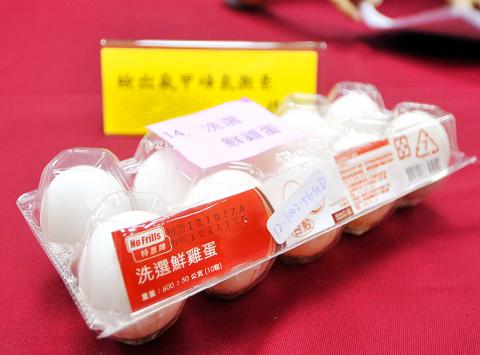A survey of 20 types of eggs sold in stores showed that one type purchased from a supermarket contained florfenicol, which can have negative effects on the liver and kidneys if consumed in large quantities, the Consumers’ Foundation said yesterday.
To cater to the high demand for eggs, many chicken farms choose to keep their hens in battery cages to save space, the foundation said, adding that when large numbers of hens are kept in a small space, the possibility of cross infections increases.
As such, farmers sometimes choose to add drugs to chickenfeed to prevent diseases and in some cases eggs from these hens become contaminated with drug residues, the foundation said.

Photo: Chen Chih-chu, Taipei Times
In addition to drugs residues, the foundation said microbial egg contamination — such as salmonella infection — is another problem that needs to be examined, so its survey also tested the eggs for salmonella and selenium levels as well as several types of drug residues.
The results showed that one type of eggs contained florfenicol, a type of antibiotic used for the treatment of bovine respiratory disease, which may harm humans and is banned under the Act Governing Food Sanitation (食品衛生管理法).
According to the act, the company responsible should inform consumers and have the contaminated products recalled and destroyed, the foundation said.
If they fail to do so, they may face a fine between NT$60,000 (US$2,000) and NT$6 million based on the damages caused, the foundation said, adding that the Department of Health should look into the case.
Results for salmonella infections and other drug residues were all found to be within regulated standards, it said.
The foundation said that although salmonella infection was not discovered in the sampled eggs, consumers should still be aware that egg shells can become contaminated during storage.
Consumers should be careful when choosing eggs and check whether there are cracks in the shell and avoid eating the egg if the yolk contains parts of the chicken, it said, adding that fresh eggs are often heavier and have a thicker shell.

Taiwan has received more than US$70 million in royalties as of the end of last year from developing the F-16V jet as countries worldwide purchase or upgrade to this popular model, government and military officials said on Saturday. Taiwan funded the development of the F-16V jet and ended up the sole investor as other countries withdrew from the program. Now the F-16V is increasingly popular and countries must pay Taiwan a percentage in royalties when they purchase new F-16V aircraft or upgrade older F-16 models. The next five years are expected to be the peak for these royalties, with Taiwan potentially earning

STAY IN YOUR LANE: As the US and Israel attack Iran, the ministry has warned China not to overstep by including Taiwanese citizens in its evacuation orders The Ministry of Foreign Affairs (MOFA) yesterday rebuked a statement by China’s embassy in Israel that it would evacuate Taiwanese holders of Chinese travel documents from Israel amid the latter’s escalating conflict with Iran. Tensions have risen across the Middle East in the wake of US and Israeli airstrikes on Iran beginning Saturday. China subsequently issued an evacuation notice for its citizens. In a news release, the Chinese embassy in Israel said holders of “Taiwan compatriot permits (台胞證)” issued to Taiwanese nationals by Chinese authorities for travel to China — could register for evacuation to Egypt. In Taipei, the ministry yesterday said Taiwan

Taiwan is awaiting official notification from the US regarding the status of the Agreement on Reciprocal Trade (ART) after the US Supreme Court ruled US President Donald Trump's global tariffs unconstitutional. Speaking to reporters before a legislative hearing today, Premier Cho Jung-tai (卓榮泰) said that Taiwan's negotiation team remains focused on ensuring that the bilateral trade deal remains intact despite the legal challenge to Trump's tariff policy. "The US has pledged to notify its trade partners once the subsequent administrative and legal processes are finalized, and that certainly includes Taiwan," Cho said when asked about opposition parties’ doubts that the ART was

If China chose to invade Taiwan tomorrow, it would only have to sever three undersea fiber-optic cable clusters to cause a data blackout, Jason Hsu (許毓仁), a senior fellow at the Hudson Institute and former Chinese Nationalist Party (KMT) legislator, told a US security panel yesterday. In a Taiwan contingency, cable disruption would be one of the earliest preinvasion actions and the signal that escalation had begun, he said, adding that Taiwan’s current cable repair capabilities are insufficient. The US-China Economic and Security Review Commission (USCC) yesterday held a hearing on US-China Competition Under the Sea, with Hsu speaking on